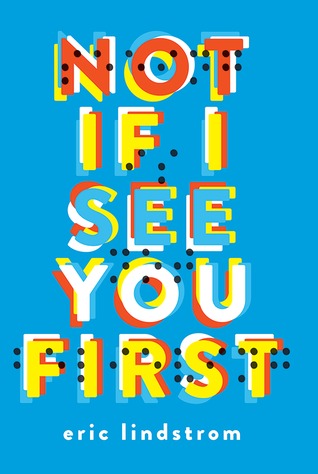Because I got it in my December Uppercasebox subscription, the first book I read in 2016 was Eric Lindstrom's Not If I See You First, a YA romance with a blind protagonist named Parker.
I was excited to read it, but I ended up rather disappointed. It's filled with stereotypes of what men think teenage girls are like and want guys to be like and how adults picture teen bullies. It's also clear that while Lindstrom "researched" by talking to adults at the Braille society, he never bothered to talk to real teenagers who are blind -- or their friends or their public school teachers.
In 2011, I ranted about authors who assume high school is like it was when they attended.
I did it again in 2015, with further comments here and here.
Now it's time to do it again.
Authors, if you're going to write about teenagers and school, you need to know what school is like in the contemporary world.
Mr. Lindstrom, if you're going to write about a blind teenager in 2015, you should talk to a few.
At our school, we've had a blind wrestling coach for years. We've had 3 blind students during the years that I've taught at the school, all boys. The first one also had developmental problems and was never in regular classes. But last year we had 2 boys in almost entirely regular classes; one of them was my student. And I can promise you, Mr. Lindstrom, that boy would laugh at some of the stuff you created -- because it's so wrong.
Let me go back to addressing the readers rather than the writers.
Lindstrom has 16-year-old Parker assigned a student buddy ALL DAY LONG, even though she's attended the school for two years and is fiercely independent. No way. No administration would put that kind of burden on a kid. Parents would sue. It's absurd.
What really happens is that a paraprofessional is hired -- if needed; every kid is different -- but teachers and students work it out in their own classrooms. My blind student last year had two seeing students with whom he preferred to work in my class when possible. During tests and for homework, however, the paraprofessional took over.
Also, Lindstrom seems to be unaware of technology. Parker uses text-to-speech on her phone, but she does not have a Braille writer for taking notes in class nor any kind of recording device. Again, this forces other kids to have to tutor her. This is not reality.
Lindstrom does not have any counselor or special ed teacher or administrator ever checking up on Parker. No adult seems to know that her father has died. No meetings are held planning her education and modifications. No teacher seems to modify anything for her. No teacher notices when Parker has a meltdown in the commons area and then she and her friends sluff school all day in a massive drama queen party. No one notifies Parker's aunt (her legal guardian). This is beyond absurd.
Special needs students have files and are assigned SPED teachers as file holders. Their progress is monitored; teachers are contacted as often as necessary and parents meet with them at least quarterly. A student who has a major meltdown would be emailed news to all concerned teachers within minutes. That student -- special needs or not -- would be with her/his counselor, the parent or guardian contacted, and friends calmed within a few minutes of the meltdown. Students who bolted from school in emotional crises would be located by the school police and their parents contacted. All teachers of a student who had lost a parent just before school started would be notified and asked to watch out for emotional needs. (Yes, I've had several students lose parents over the years.)
Also, Lindstrom has the jock bullies pick on Parker so her love interests can rescue her. It happens right by her locker. This is unbelievable.
First of all, it has been uncool for years to pick on the physically handicapped. Only once in my long years of teaching have I seen a physically handicapped kid get picked on (a wheelchair user -- and every other kid present came to his defense within seconds). Bullies pick on the emotionally sensitive or mentally slower rather than the physically challenged. And schools in the post-millenium world have security cameras. No bully is going to go on camera doing stuff as obvious as what happens in this book.
Do I recommend this book? Sort of. It's mostly a romance; if you enjoy high school romances, this might be for you. (Note: there's no sex or violence, but there's a lot of swearing, if that offends you.) The characters are fairly stereotyped, although Parker herself has a bit more depth. The pacing is good. And the book has been edited, which is always a plus.
If you're not a school teacher or a student yourself, the Hollywood version of high school might not bother you as much as it did me.
Give the book a try. You might like it.

No comments:
Post a Comment